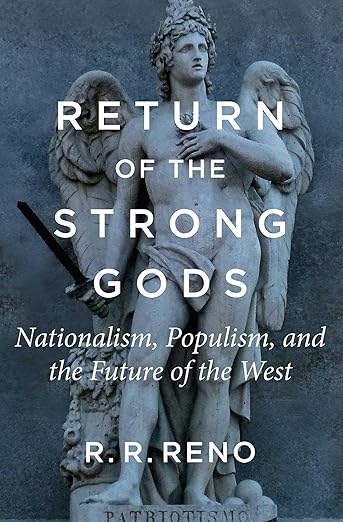Over the last several years, there has been no shortage of books arguing that liberalism, in the broad sense, has gone wrong over the last few generations. Every now and then I read one of these books to see what I might learn or gain. As Edmund Burke said, “He that wrestles with us strengthens our nerves and sharpens our skill. Our antagonist is our helper.” The antagonist of liberalism I’ve most recently read is R. R. Reno and his book Return of the Strong Gods: Nationalism, Populism, and the Future of the West.

Over the next several posts, I will be going through his book and unpacking his overarching argument. As is always the case when I do these extended reviews, the initial posts will simply be my attempts to outline and explain his argument as clearly as I can, with my own views on the matter kept aside. Any points of endorsement or criticism I have will be saved for the end of the series. To the extent that readers have questions or comments about Reno’s ideas, I will do my best in the comments to answer them as I believe he would, rather than with my own point of view.
With that preamble out of the way, let’s see what Reno has to say.
Reno’s book leans heavily on a metaphorical idea of strong and weak gods. This notion isn’t about actual deities – as Reno puts it:
By “strong gods” I do not mean Thor and the other residents of the Old Norse Valhalla. The strong gods are the objects of men’s love and devotion, the sources of the passions and loyalties that unite societies. They can be timeless. Truth is a strong god that beckons us to the matrimony of assent. They can be traditional. King and country, insofar as they still arouse men’s patriotic ardor, are strong gods. The strong gods can take the form of modern ideologies and charismatic leaders. The strong gods can be beneficent. Our constitutional piety treats the American Founding as a strong god worthy of our devotion. And they can be destructive. In the twentieth century, militarism, fascism, communism, racism, and anti-Semitism brought ruin.
That last point is a key item in Reno’s argument. The many gods of Greek and Norse mythology had wildly different characters. Some of these gods were kind and compassionate, some were mighty but aloof, and some were capricious or outright antagonistic towards mortals. Reno’s metaphorical strong gods, too, can be similarly varied in their social influence. The strong gods of Reno’s work can be socially unifying and beneficial, but they can also be dangerous and destructive. Not everything that “unites societies” by means of “passions and loyalties” will be peaceful or virtuous. Strong gods can be wicked gods.
But, Reno says, there are also weak gods. Weak gods are ideas that are meant to make society ever more open, and to continually soften away any rough edges. The modern mind, Reno says, “seeks the ministry of weak gods, or better, the gods of weakening who open things up.” He goes on to say,
Today, one of our leading imperatives is inclusion, a god who softens differences. Transgression is prized for breaking down boundaries – opening things up. Diversity and multiculturalism suggest no authoritative center.
One major characteristic of “weak gods” is that the weak gods tend to simply be focused on negation – on the vices we seek to avoid, rather than the virtues we seek to cultivate. Those who are most devout in their service to the weak gods would describe themselves as being committed to antiracism, antifacism, antidiscrimination, and the like:
These anti imperatives define the postwar era. Their aim is to dissolve the strong beliefs and powerful loyalties thought to have fueled the conflicts that convulsed the twentieth century.
What, exactly, is the long run result of these “anti” imperatives? Reno puts it this way,
In the pages to follow, I will show how anti-racism and anti-totalitarianism inspired a general theory of society. That theory has many forms, some explicit, others tacit. But it is characterized by a fundamental judgment: whatever is strong – strong loves and strong truths – leads to oppression, while liberty and prosperity require the reign of weak loves and weak truths.
Strong national loyalties run the risk of leading to the kind of aggressive, imperialist conquests of Nazi Germany. Weakening the sense of national identity and national loyalty thus mitigates this risk. Strong beliefs in moral rules and truths can lead to the marginalization and ostracism of those who sit outside of the strong social consensus. Weakening public morality – or, equivalently, making public morality ever more open and avoiding the casting of moral judgment – prevents persecution.
Here’s an example I think Reno would agree illustrates his claim. In American culture, the importance, even primacy, of the traditional, two-parent household was a strong god. People were expected to get married, and to be married before having any children. Once married, families were expected to stay together. When traditional marriage was a strong god, people who remained unmarried for too long, or who had kids before being married, were looked down upon. Divorce was shunned, and single parents could be pariahs. The strong god of traditional marriage, Reno might say, was replaced with the weak god of nonjudgmental acceptance of all forms of family life as equally valid.
Truth is a strong god, and truth is by its nature is exclusionary. Truth, to be upheld, keeps us within barriers, and if you are out of alignment with the truth, that is a failing on your part you are responsible to fix. The strong god of “the truth”, on the other hand, can be replaced by the weak god of “personal truth,” where everything is opened up, where people can unironically say, as one primer against “white supremacy culture” recently put it, “something can be true but not be my truth.” The weak god of “personal truth” would also affirm the reverse – something can validly be “my truth” even if it isn’t true.
And this, Reno thinks, is the real source of the woes facing modern society. Society cannot be held together simply by values of negation, or by being endlessly open-ended. The real problem isn’t liberalism, per se, but rather the rule of weak gods over society. As Reno puts it,
The West is careening toward crisis not because of a defect deep within modernity. Our troubles do not stem from William of Ockham, the Reformation, John Locke, capitalism, or modern science and technology…The fall of man left every civilization, every era under the law of entropy, which is why renewing shared loves and unifying loyalties is one of the primary arts of leadership. This is what we lack today. The distempers afflicting public life today reflect a crisis of the postwar consensus, the weak gods of openness and weakening, not a crisis of liberalism, modernity, or the West…Our time – this century – begs for a politics of loyalty and solidarity, not openness and deconsolidation. We don’t need more diversity and innovation. We need a home. And for that, we will require the return of the strong gods.
But who drove the strong gods out of society, and why? That will be the topic of the next post.
